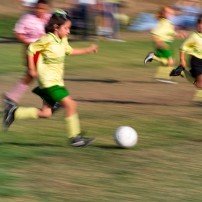Sports Dehydration in Children
A Simple Guide for Parents
by Merlin Hearn
Note: As an Amazon Associate I earn from qualifying purchases.
Is there really any risk of dehydration in children who are active in sports?
It’s a cold autumn day and you are watching your child play a game of soccer.
As you stand on the sideline in your sweatshirt and beanie, it is hard to imagine that he/she could be getting dehydrated.
Unfortunately, millions of children are not getting the proper hydration they need before, during, and after sporting events or practice sessions.
Why Dehydration in Children Is Common
As a parent, you may have heard about the risks of dehydration in children who are involved in sports. Making sure your young athlete stays hydrated is important for their fitness as well as their health and safety.
Since many children these days are drinking so many other beverages in place of water, the risk of dehydration in children who are athletes is increasing because they are already dehydrated!
Water makes up about 75 percent of children’s muscle tissue. Thus, it makes sense that in order to keep their muscles functioning well, they need to stay hydrated with clean water.
In addition, water regulates body temperature, aids digestion, cushions joints, transports nutrients to the cell, and removes toxins. Proper hydration can also minimize the amount of muscle soreness after exercise.
The Price of Dehydration
When your child plays a sport, they lose valuable fluids through sweating and hard breathing. If they are not refueling their fluids, or if they are already low, they could easily suffer from dehydration.
Dehydration can cause a lack of response from the muscles, affecting their performance. When dehydrated, your children will tire much faster and more often -- and will usually be irritable to boot.
The more serious effects of dehydration can include heat exhaustion, a heat stroke, an increased heart rate, and body temperature rising to dangerous levels.
How to Prevent Dehydration in Young Athletes
Dehydration in children and young adults can easily be avoided.
It begins with educating your child (and possibly his/her coach) on how to stay properly hydrated and why it’s important.
The following are guidelines for when and how much water your child should drink for sporting events and practices.
Notice that the age and weight will affect how much water your child should drink within the range of ounces.
Before (1-2 Hours)
- 4-8 oz. for children ages 6-12
- 8-16 oz. for young adults ages 13-18
Right Before (10-15 Minutes)
- 4-8 oz. for children ages 6-12
- 5-10 oz. for young adults ages 13-18
During (Every 20 minutes)
- 5-10 oz. for children and young adults ages 6-18 (depending on weight)
After (Within Two Hours)
- 24 oz. for every pound of weight lost
Tips and Recommendations
- Encourage your child to drink plenty of clean (filtered) water throughout the day.
- Children should be drinking water (rather than sports drinks or other beverages) for moderate exercise lasting up to an hour or so. Read more on water vs sports drinks.
- If the sporting event or practice is longer then 60 minutes, I do recommend a sports drink for children to replenish electrolytes in the body. You can make your own electrolyte enhanced water rather than offering the store bought versions (which are generally full of sugar and are highly acidic). This is easy to do and much less expensive.
- If your child refuses to drink water or is used to drinking sports drinks, give them organic fruit juice diluted 50-50 with water and add a pinch of sea salt or Celtic salt (which mimics the taste of sports drinks and provides a healthier alternative).
- Avoid bottled water, most of which are merely re-processed tap water or de-mineralized water, which is not healthy.
- Stop providing sodas for your children at home. Sodas are EXTREMELY acidic and oxidizing to the body. Most sodas also contain caffeine, which further dehydrate your child.
- Allow your child to choose his own BPA-free reusable water bottle to take to practice and sporting events. They will be less likely to lose it if they can choose their own kid-friendly bottle.
If you follow these guidelines seriously, you will have one less thing to worry about as you watch your kid go for that goal!
Reference
Kidshealth.org; Dehydration; 2017.
Further reading . . .
Dehydration Symptoms in Children
Return from Sports Dehydration in Children to Proper Hydration for Sports
If you would like to reproduce or republish this article or any other article on this site, feel free to do so but please include a reference or link to the article at WaterBenefitsHealth.com.
Sign Up for Our Monthly
Newsletter
Visitor Comments
"This was the best and most straight forward info on the net yet. I asked a question and got an answer that made sense. Thank you so much!" - Linderlinder
FINALLY!!! I have been wondering about this for years with no 'solid' answer. This is exactly what I've been wanting to know! Thank you for this share..." by Andy
"Thank you for the information, Nancy. I appreciate it. Your article and findings are very helpful, referring to dehydration." - Carolyn
"Lemon water is one drink both my wife and I can't drink. It upsets our stomachs. We are in our sixties and in very good health—well, better health now that we drink about 2 liters plus of water each day. It has made so much difference to our digestive systems and recovery every day. Thank you for your website and effort." - Rod



